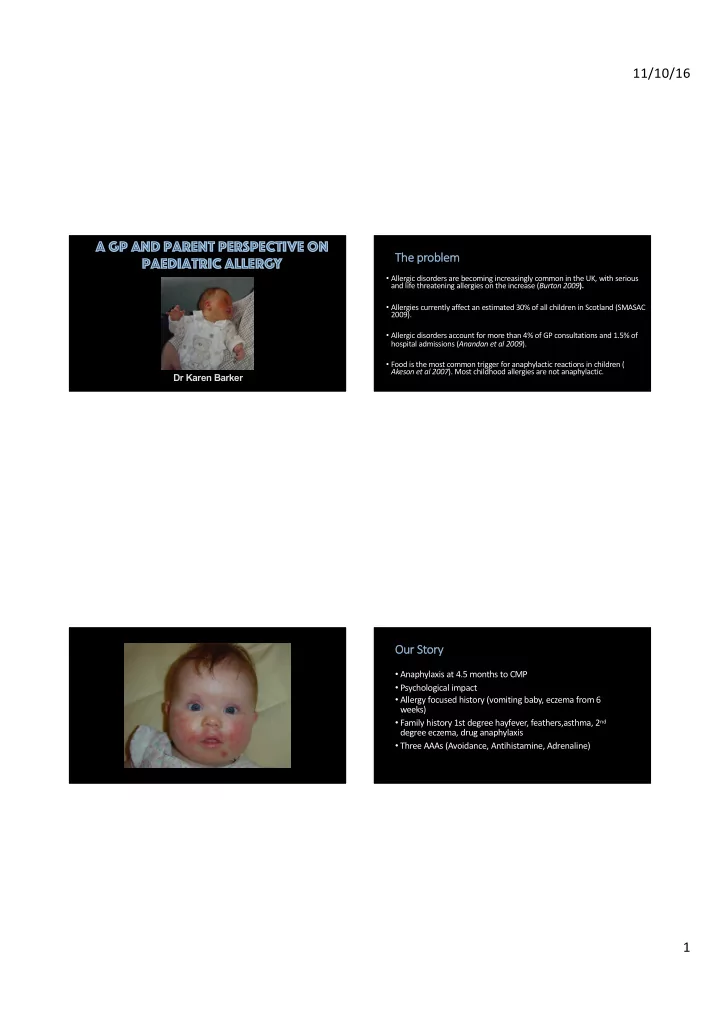

11/10/16 A GP and Parent Perspective on Th The e prob oblem em Paediatric Allergy • Allergic disorders are becoming increasingly common in the UK, with serious and life threatening allergies on the increase ( Burton 2009 ). • Allergies currently affect an estimated 30% of all children in Scotland (SMASAC 2009). • Allergic disorders account for more than 4% of GP consultations and 1.5% of hospital admissions ( Anandan et al 2009 ). • Food is the most common trigger for anaphylactic reactions in children ( Akeson et al 2007 ). Most childhood allergies are not anaphylactic. Dr Karen Barker Ou Our Story • Anaphylaxis at 4.5 months to CMP • Psychological impact • Allergy focused history (vomiting baby, eczema from 6 weeks) • Family history 1st degree hayfever, feathers,asthma, 2 nd degree eczema, drug anaphylaxis • Three AAAs (Avoidance, Antihistamine, Adrenaline) 1
11/10/16 How a child might describe a reaction to a food allergen… • This food is too spicy • My tongue feels like there is a hair on it • My tongue is hot (or burning) • My mouth feels funny • It feels like something is • There’s a frog in my throat poking my tongue • There’s something stuck in • My tongue (or mouth) is my throat tingling (or burning) • My lips feels tight • My tongue or mouth aches How a child might describe a reaction to a food allergen… • My tongue feels full (or heavy) • It feels like there are bugs in my ears • My throat feels thick • It feels like there is a bump in the back of my tongue (throat) 2
11/10/16 Impact on family life Wh Which foods? • Food is central to our lives • Restrictions to keep well • Allergic reactions to food usually start in early childhood • Psychological impact trauma of severe allergic reaction • Top offenders • Weaning • Shopping • Fish • Cow’s milk (2 - 2.5% of all • Molluscs children) • Siblings • Crustaceans • Egg • Social events eg parties • Celery • Soya • Lupin • Peanuts (1 in 50) • Eating out • Sesame • Tree nuts • Nursery /school • Mustard • Gluten • Sulphites • Activities • Self confidence 3
11/10/16 Management • Multiple Hospital visits –explanation • Skin prick tests, IgE specific blood tests • Day case food challenges • School age grown out of CMPA and majority of reaction to egg, residual nut • Self awareness Wh What helped in the allergy journey? Ch Challenges in General Practice • Dietetics • Common presentation • Specialist allergy nurse • Resources • Health visitor • Lack of education • Community pharmacist • Self diagnosis • Friends and Family • Patient expectation “want a test” • Our girl • Allergy clinic waiting times 4
11/10/16 Im Improving allergy care in practice • Audit • Allergy management guideline for vision • Demo autoinjectors and care plans • Educational sessions- RCGP, local school, GPs, PPG • Mail shot • Annotation of childrens notes regarding weight • Regular meetings child health nurse Ph Pharmacy perspective • Medication reviews- repeats, dosages, overdue prescriptions • Indications that patients with allergy may have suboptimal control of asthma • Holistic in prescribing, day to day and travelling • Informing patients of expected side effects • Labelling smaller bottles for antihistamine • MHRA approval for legislation change for provision of generic autoinjectors 5
11/10/16 Re Resources • NHSG Intranet • Anaphylaxis Campaign ( anaphylaxis.org.uk ) • British Society of Allergy and Clinical Immunology ( bsaci.org ) • Allergy UK (www.allergyuk.org) 6
Recommend
More recommend